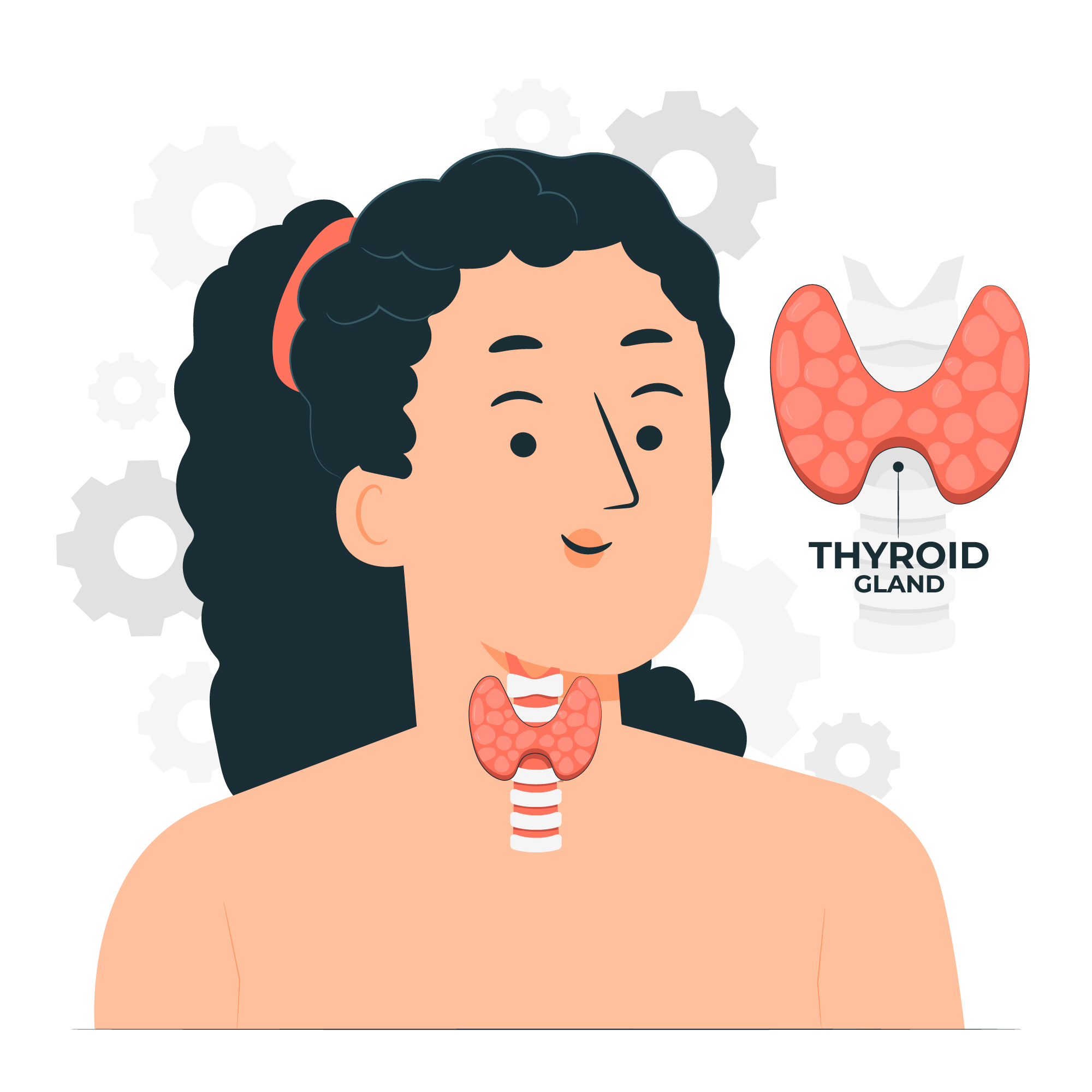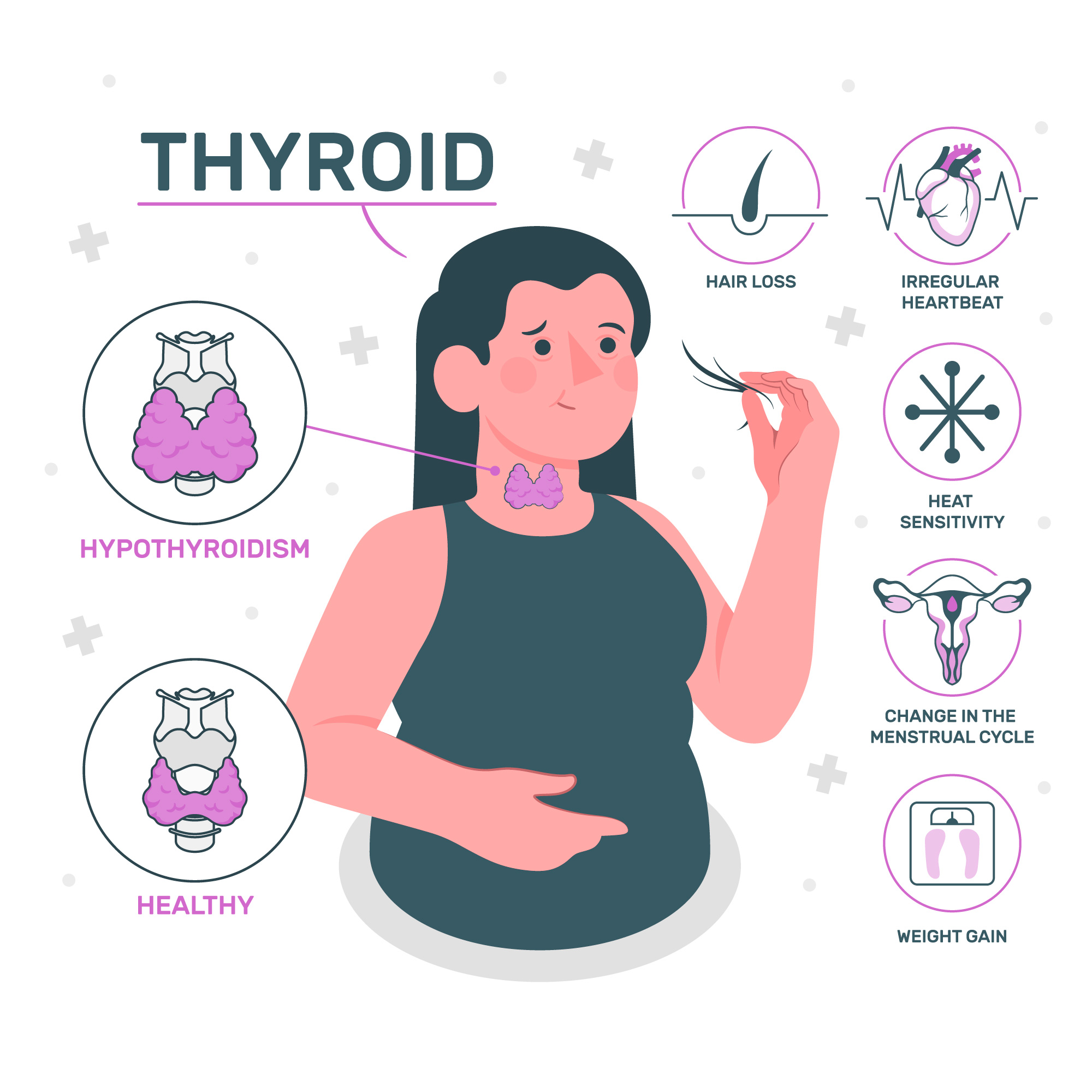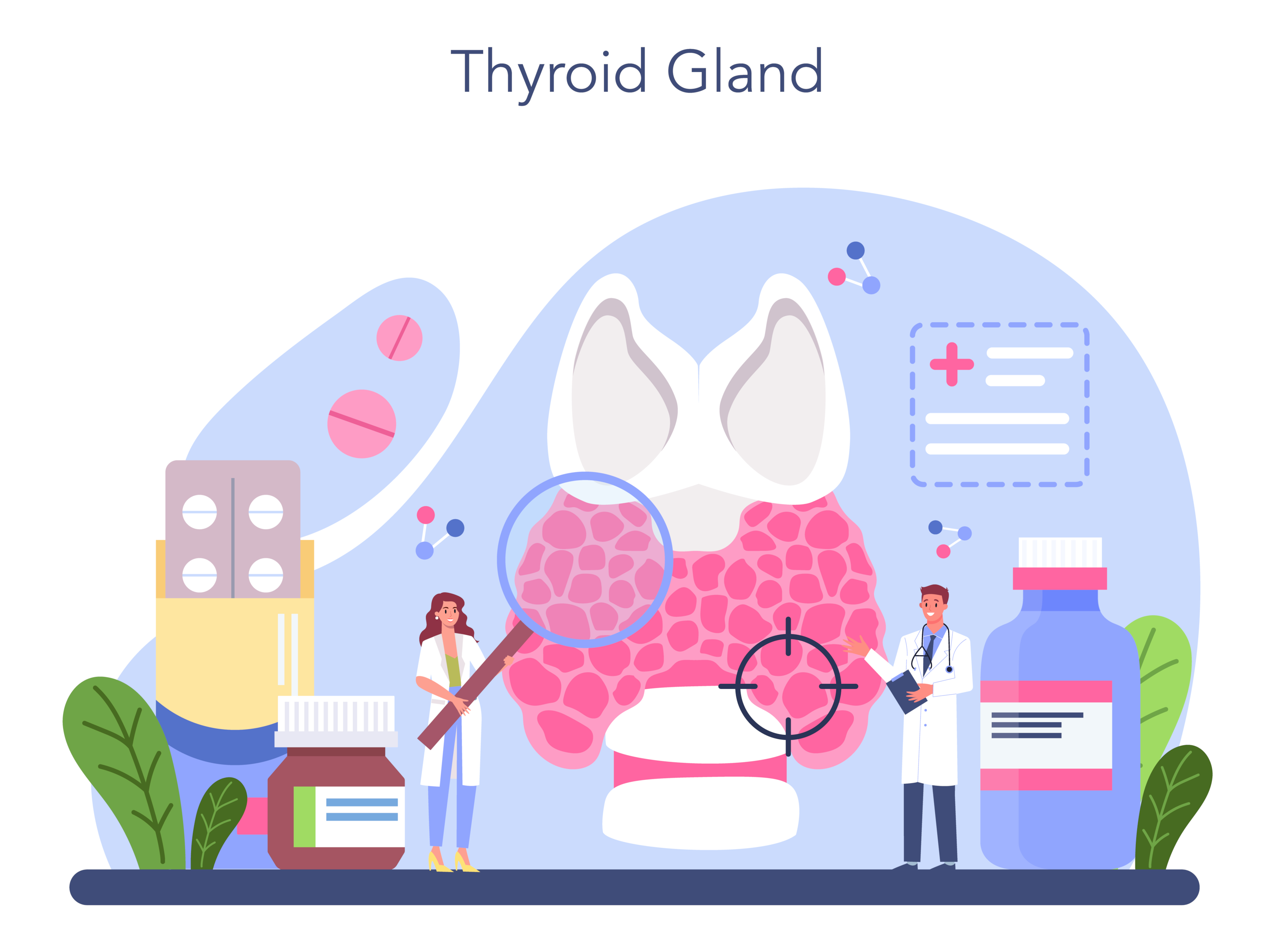What are the early warning signs of thyroid problems?


It may be difficult to diagnose thyroid issues on your own. This is because they may be misconstrued for other medical conditions like menopause or cognitive impairments. On the other hand, you should be aware of thyroid problems' early warning signals. According to statistics, 12% of people will encounter a thyroid issue at some point in their lives. Treatment is the key to feeling normal again. Treatment for thyroid issues may be greatly aided by being aware of their early warning symptoms.
The thyroid gland is located near the front of the neck, surrounding the windpipe known as the trachea. It has two broad wings that wrap around the side of your throat and looks like a butterfly-shaped gland with a smaller centre. Glands in your body manufacture and release substances that aid in numerous bodily activities. Your thyroid produces hormones that assist in regulating several important bodily processes, known as thyroid-stimulating hormones.

If your thyroid isn't working properly, your entire body may suffer. Hyperthyroidism is a condition that occurs when your body creates an abnormally large amount of thyroid hormone levels. Hypothyroidism is a disorder in which your body does not create enough thyroid hormone. Both illnesses are serious and necessitate the care of a healthcare professional.
Although the words tired and fatigued might be used interchangeably, the fatigue that people with hypothyroidism and other thyroid problems experience is very distinct. You can toss and turn in bed and have a terrible time sleeping if you have thyroid dysfunction. While getting a good night's sleep will frequently make you feel better, it won't make thyroid disorders-related lethargy go away.
Middle-aged women may find it particularly challenging to distinguish this because menopause is frequently accompanied by weariness. However, even after taking oestrogen, millions of women still have persistent menopausal-like symptoms. This can indicate a thyroid condition that hasn't been properly recognised, according to the American Association of Clinical Endocrinologists.
Energy metabolism alterations can cause an underactive thyroid because of low energy levels carbohydrates are not processed as they should. It can be felt as exhaustion or brain fog.
2. Weight GainYour metabolism may not function properly as a result of thyroid issues, which can significantly impact your body weight.
Measuring a patient's BMR, or basal metabolic rate, was one of the earliest methods of thyroid disease testing. With this test, the amount of oxygen your body utilises over a predetermined period is measured to evaluate your metabolism. A low BMR score in this scenario might imply or develop hypothyroidism.
The majority of people who have hypothyroidism will gain some weight, which may or may not be noticeable. Severe hypothyroidism, on the other hand, can cause a substantial weight gain of 5 to 10 extra pounds. Not always does this weight gain result from gaining extra fat. Instead, it might be brought on by the body holding water and salt.
3. Weight LossLosing weight might also result from thyroid issues. The thyroid gland is underactive in hypothyroidism, whereas the thyroid is overactive in hyperthyroidism. Your BMR results would be significantly higher than usual in these circumstances.
The amount of weight you lose as a result of an overactive thyroid will depend on how severe your illness is, similar to how much weight you acquire. More calories are burned by a very hyperactive thyroid than by a healthy or underactive thyroid. If you don't meet your new calorie needs, you could gradually lose weight.
However, because hyperthyroidism also causes an increase in hunger, some people still put on weight despite having an overactive thyroid. This merely serves to highlight the intricacy of the thyroid and the part it plays in metabolism and body weight. Although other elements affect weight, your thyroid's condition is still a key signal.
4. Slowed Heart RateYour heart health may be impacted by the condition of your thyroid. For instance, hypothyroidism causes the thyroid hormone to be produced insufficiently, which slows the heart rate. More than just your heartbeat may be impacted by this. Insufficient thyroid hormone over time can also make your arteries less elastic, which makes it harder for the blood to circulate and can lead to high blood pressure. The presence of hypothyroidism might also result in higher cholesterol levels.
5. Increased Heart RateInstead of a reduced heart rate, those with hyperthyroidism have an elevated heart rate. Faster, harder, and irregularly paced heartbeats can be experienced when the thyroid gland produces too much thyroid hormone.
This can result in:
Hyperthyroidism can cause high blood pressure, much like hypothyroidism does. A combination of high blood pressure and narrowed or stiffened arteries can also result in a higher risk of heart disease, angina or chest symptoms.
6. Sensitivity to HeatHeat sensitivity is a typical sign of an overworked thyroid. Hyperthyroidism makes your metabolism go into overdrive and burn more calories, as mentioned regarding weight reduction. But this has an impact on more than just your weight. You may become significantly more sensitive to heat if you have too much thyroxine, the thyroid hormone.
Hot flashes are only one aspect of heat sensitivity or heat intolerance. People with unusually high heat sensitivity experience heat when others are at ease or even chilled. People who have hyperthyroidism may experience unusual perspiration as a result of this, as well as heat-related anxiety.
7. Sensitivity to ColdThe hands and feet of hypothyroidism sufferers are frequently chilly. Even in spaces where everyone else feels warm, this is still possible. Your metabolism slows down as a result of your body not creating enough thyroxine. Over time, hypothyroidism impairs your body's capacity to produce energy that keeps you naturally warm, making you more vulnerable to the cold.
Depending on the sort of problem you have, thyroid conditions can have a variety of effects on you, sometimes even in the opposite direction. Energy levels, weight, body temperature, heart rate, and how you respond to heat and cold can all be included. Even though these signs and symptoms could indicate a thyroid problem, a proper diagnosis and treatment plan requires consultation with a healthcare provider. Other common symptoms may include:
You may be interested in learning how these difficulties might be addressed once you identify the early indicators of thyroid disorders and suspect that you are having some thyroid problems. Surgery and prescription drugs are the two most popular options.
1. MedicationThe market is filled with various prescription medications that are frequently used to treat hyperthyroidism and hypothyroidism. Others are injected at regular intervals, but the majority are taken every day in the form of a pill or capsule.
2. SurgeryThe thyroid is occasionally removed during surgical surgery. This occurs most frequently in cases of hyperthyroidism, which can be difficult to treat with medicine or when the thyroid has already caused serious medical problems. Additionally, medicine is frequently provided after surgery.
Although these two methods are the most frequently used to treat thyroid issues, they are not the only ones. If other solutions would be better for you, we'll let you know.
The thyroid creates hormones that control how the body's metabolism, growth, and energy are distributed. Problems might arise when the thyroid levels get too high or too low. Thyroid disease comes in a variety of forms, such as hyperthyroidism, hypothyroidism, thyroiditis, and Hashimoto's thyroiditis.
When the thyroid doesn't produce enough hormones, hypothyroidism develops. This can make you gain weight and have less energy. In hypothyroidism, you could also begin to have peripheral neuropathy. However, this typically appears as a late symptom of a chronic illness.

When too many hormones are produced, hyperthyroidism develops, which can lead to weight loss and, occasionally, a harmful increase in energy.
Make an appointment at the nearest hospital if you have tremors, lost or gained a lot of weight, have muscle weakness, or have any of the other symptoms mentioned above.
1. Receiving Blood TestsThe doctors might suggest getting a blood test if they think your physical symptoms or other symptoms are being brought on by a thyroid issue. We suggest you take a look at our Thyroid Blood Test kit which will give an accurate status of your thyroid functions. You will feel completely at ease throughout the little time it will take a tiny sample of blood, which will only take a few minutes. This sample will be used to examine your hormones and antibodies. Thyroid blood tests can aid in the diagnosis of the problem and the start of a regimen to regulate the illness if signs or symptoms of thyroid problems appear.

Blood tests for the thyroid are used to identify thyroid conditions linked to hyper- or hypothyroidism. These consist of:
People with hypothyroidism experience severe difficulties with their weight, mood swings, and focus. People who have hyperthyroidism are constantly agitated, have trouble sleeping, and may eventually have serious cardiac problems.
Eating meals high in iodine can occasionally be the remedy if you've seen these issues in yourself. However, speaking with your doctor is crucial if you're already doing that and are still having these issues to receive a diagnosis and begin therapy.










Plus get the inside scoop on our latest content and updates in our monthly newsletter.